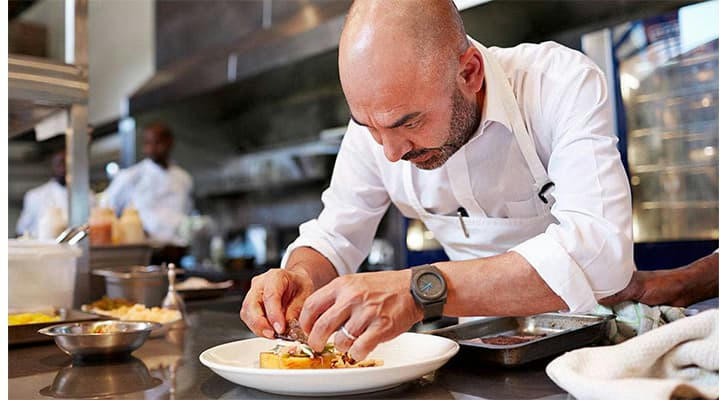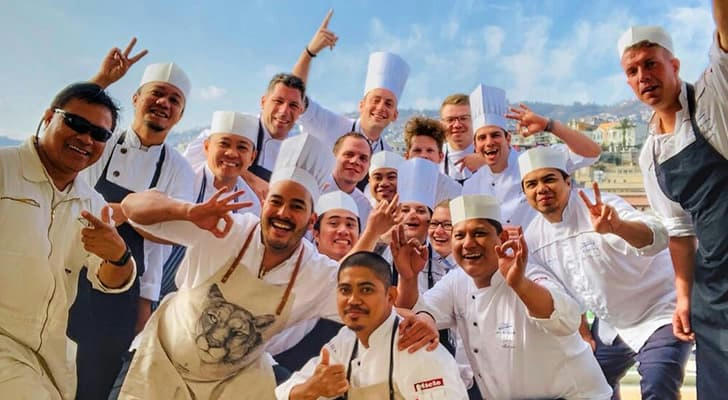Chefs Unplugged: The Skills, Challenges, and Rewards of Culinary Leadership
The role of a chef is not just about passion for cooking; it also offers a dynamic career with a variety of opportunities, challenges, and rewards. As one of the most sought-after professions in the culinary world, the position of a chef is both competitive and rewarding. In this article, we’ll explore the employment situation for chefs, career development opportunities, and salary expectations, providing a comprehensive overview of what aspiring chefs can expect from their journey in the industry.

Employment Situation for Chefs
The demand for skilled chefs has remained steady, with the culinary industry continuously growing as people’s interest in food evolves. As restaurants, hotels, resorts, and catering services expand globally, chefs are increasingly sought after for their ability to create memorable dining experiences. According to industry reports, the hospitality sector is one of the largest employers worldwide, and the demand for chefs is expected to continue to rise.
Where do Chefs Work?
Restaurants and Hotels: The most common places of employment for chefs are restaurants and hotels, ranging from fine dining to casual eateries. The type of establishment dictates the nature of the work and expectations. Fine-dining restaurants often seek highly skilled chefs, while casual dining restaurants may offer less intense work environments.
Catering Services: Chefs working in catering services have the flexibility to work on special events, such as weddings, corporate gatherings, or private parties. Catering chefs often experience more diverse cooking opportunities since they can prepare different types of cuisine for various occasions.
Cruise Ships and Resorts: The tourism and travel industries provide opportunities for chefs to work in exotic locations, catering to international guests. Working aboard cruise ships or in luxury resorts can offer both travel and culinary experiences, though it often requires long hours and time away from home.
Food Trucks and Pop-up Restaurants: The rise of food trucks and pop-up dining concepts has created new avenues for chefs, especially for those looking to establish their own brands. These setups allow chefs to showcase their unique cooking styles without the large overhead costs of a full-scale restaurant.
Private Chef: Some experienced chefs opt for a more personalized career by becoming private chefs for individuals, celebrities, or large families. This role involves preparing meals in private homes, and the salary can vary significantly based on the clientele.
While the job market for chefs is robust, the profession remains competitive. Aspiring chefs must often complete formal training, gain experience, and build a strong portfolio before landing higher-level positions. Additionally, chefs in remote locations or niche culinary fields may find it harder to secure top positions, though demand for skilled chefs in these areas is often high.

Career Development for Chefs
Career advancement for chefs typically follows a well-defined path, but it also offers numerous opportunities for specialization and growth. Here’s an overview of common career stages and development:
Entry-Level: Line Cook and Prep Cook
Most chefs start their careers as line cooks or prep cooks. These positions involve hands-on food preparation and cooking in the kitchen, where one learns basic techniques, kitchen organization, and how to work efficiently under pressure.
Some chefs begin their careers in less demanding environments, such as smaller restaurants or cafes, before advancing to more high-end establishments.
Sous Chef
After gaining significant experience, a line cook may be promoted to a sous chef, the second-in-command in the kitchen. In this role, a chef assists the head chef with meal preparation, managing kitchen staff, and ensuring smooth kitchen operations.
As sous chefs, individuals are exposed to leadership and administrative duties, which prepare them for more advanced positions in the culinary field.
Head Chef/Executive Chef
The head chef, or executive chef, is responsible for overseeing the kitchen's operations, including menu planning, food preparation, and management of staff. This position requires advanced culinary skills, leadership abilities, and a solid understanding of business practices, such as budgeting, inventory management, and cost control.
Becoming an executive chef typically requires years of experience and a proven track record of success in the kitchen. Executive chefs may also be responsible for multiple restaurant locations or managing a kitchen at a hotel or resort.
Specialization
Some chefs may choose to specialize in a specific type of cuisine, such as pastry, seafood, or vegetarian dishes. Specializing allows chefs to develop expert knowledge in a specific culinary field, and it can lead to opportunities in high-end restaurants or as consultants for other businesses.
Other chefs may become experts in areas like food styling, recipe development, or culinary writing, leading to opportunities in food media, cookbooks, or television appearances.
Restaurant Owner or Entrepreneur
A successful chef may eventually choose to open their own restaurant or food-related business. This requires a mix of culinary skills, business knowledge, and a strong personal brand.
While being a restaurant owner can be financially rewarding, it also comes with significant risks and responsibilities, including managing finances, marketing, and customer relations.
Culinary Educator
- Experienced chefs may also choose to become culinary instructors at culinary schools or community colleges. Teaching future chefs and passing on industry knowledge is a fulfilling career path, especially for those passionate about education and mentoring.

Chef Career Path and Advancement
As chefs gain experience, they can advance to positions such as Head Chef, Executive Chef, or Culinary Director. Executive chefs may also pursue opportunities in culinary operations management, restaurant ownership, consulting, or culinary training.
| Job Title | Average Salary |
|---|---|
| Kitchen Manager | $56,460 |
| Head Chef | $73,632 |
| Executive Sous Chef | $76,481 |
| Executive Chef | $80,040 |
| Corporate Chef | $94,608 |
| Culinary Director | $95,106 |
The chef profession offers dynamic career opportunities with a clear path for growth, whether you aim to become a head chef, open your own restaurant, or specialize in a specific culinary field. While the salary can vary greatly depending on your role, experience, and location, it’s a career that provides both financial and personal rewards. With strong demand across the culinary industry, chefs have access to diverse employment opportunities, from working in top-tier restaurants to becoming food entrepreneurs. Whether you're just starting out or an experienced professional, the culinary field continues to evolve, presenting exciting prospects for those passionate about food and cooking.
